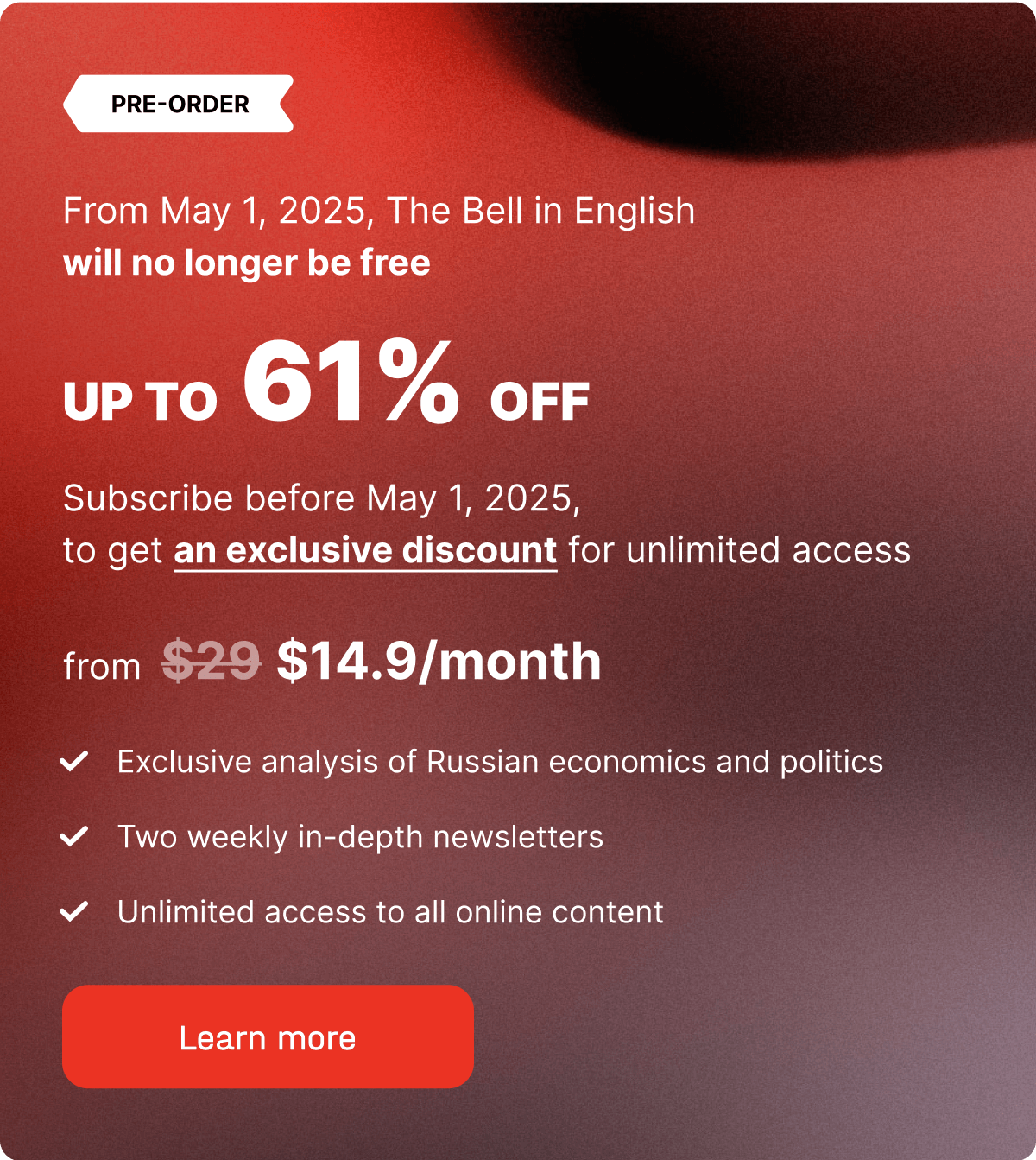
Nabiullina defends high interest rates
Hello! Welcome to your weekly guide to the Russian economy – written by Alexander Kolyandr and Alexandra Prokopenko and brought to you by The Bell. Our top story this week is a look at Central Bank head Elvira Nabiullin’s defense of a tight monetary policy in the face of sustained criticism. We also look at U.S. sanctions on Gazprombank.
Central Bank to stay the course on monetary policy tightening
The head of Russia’s Central Bank, Elvira Nabiullina, continues to face down her critics. Last week, the Central Bank fought back against business leaders who wanted to curb the regulator’s independence. This week, Nabiullina defended record high interest rates before a hostile audience in the Russian parliament.
Nabiullina defends high rates
Nabiullina told deputies Tuesday that the current situation (with interest rates hiked to 21 percent last month) is different from previous crises when the Central Bank raised rates sharply but was then able to lower them again quickly. On those occasions, rates went up in response to external shocks and to “prevent inflation from escalating, cope with a run on the banks, and maintain financial stability.” As soon as those aims were achieved, the Central Bank was able to cut interest rates in order to promote economic growth.
But now, according to Nabiulina, things are different. The economy is stretched, and a labor shortage means productivity can’t be boosted. Without a strict monetary policy, she said, the economy would be vulnerable to stagflation (low growth and high inflation).
The Central Bank is betting that, by making money more expensive, the lending market will cool, savings will grow, and consumption will fall. All of this helps to combat inflation. At the same time, the Central Bank is trying to limit the debt burden on large businesses. On Thursday, it published a draft regulation introducing surcharges on new loans, and bonds, for large corporate borrowers, which already have significant debt burdens.
Why the Central Bank is tightening lending
Unlike the retail lending sector, Russia’s corporate sector shows no signs of slowing. “Companies took out loans worth 1.6 trillion rubles in August, the same amount in September and, according to preliminary estimates, a similar sum in October,” Nabiullina said. Through the first nine months of this year, corporate borrowing rose 14.5% – more than the same period in 2023 (even though interest rates were 10 percentage points lower).
This sort of growth is more than what the Central Bank expected. Halfway through this year, it estimated the increase in corporate borrowing in 2024 would amount to up to 15%. Last month, it revised that forecast upward to as much as 20%.
High interest rates, however, have brought notable changes to the way the corporate loan portfolios are structured. In April, the absolute volume of loans issued at floating interest rates outstripped the volume of fixed-rate loans for the first time. In other words, businesses were increasingly opting for a variable rate, gambling that the Central Bank would soon switch to cutting rates. This has not paid off – in turn increasing the debt burden further and driving the Central Bank to push interest rates yet higher. It’s a vicious circle.
The Moscow think tank, the Center for Macroeconomic Analysis and Short-term Forecasting recently pointed out that we’re increasingly seeing a painful convergence of interest rates and company profitability. This means that, going forward, Russian companies will find it harder and harder to service borrowing. Nabiullina, however, disagrees with this sort of analysis. She argued in the State Duma that, while companies’ debt servicing costs are, indeed, increasing due to high rates, over the last five years, the ratio of spending on interest payments against the cost of production has never exceeded 5%.
Despite the chorus complaints and criticism of the Central Bank, high rates have not yet had any significant economic consequences for Russia. Nabiullina promised to deputies that, soon, there will be a breakthrough in the battle against inflation, the rate of corporate borrowing will start to drop, and the overheating economy will cool. If that all happens, it will be possible for the Central Bank to reduce interest rates next year. Nabiullina dismissed claims that high interest rates actually contribute to higher inflation. She appeared determined to defy critics, and continue to pursue her chosen path of a tight monetary policy.
Why the world should care
Judging by the restrained reaction of deputies to Nabiullina, the Russian parliament has not received any orders from the Kremlin to undermine or vilify the head of the Central Bank. This suggests that Nabiullina will likely be allowed to stay on in her post. The first indicator of whether she is on the right path will be Russian corporate borrowing data over the next few months. Until we see a decrease, an interest rate cut is unlikely.
State-owned Gazprombank hit with U.S. sanctions
The U.S. expanded financial sanctions Thursday to include the last major Russian bank largely unaffected by Western restrictions, Gazprombank. The state-owned bank had escaped sanctions up to now because of its role in Russia’s energy trade.
- The sanctions won’t just affect Gazprombank proper, but also its foreign divisions in Luxembourg, Hong Kong, Switzerland, South Africa, and Cyprus. Other institutions and individuals that were sanctioned by the U.S. include BCS bank, which is owned by a large Russian brokerage of the same name, staff at the Shanghai branch of state-owned VTB bank, and Central Bank deputy heads Vladimir Chistyukhin and Dmitry Turin, as well as some heads of department at the regulator.
- In a separate move, the U.S. issued warnings to foreign financial organizations about the risk of secondary sanctions if they decide to join the Russian Financial Messaging System (SPFS), a local alternative to international payments system SWIFT. SPFS, which was set up earlier this year, is already under EU sanctions. Another key part of Russia’s national payment system – card operator NSPK – that has been replacing Visa and Mastercard – was sanctioned in Feb. 2024.
- SPFS can be used for cross-border settlements. At the end of last year, 557 banks and companies were connected to the system, including 159 non-resident organizations in 20 countries. Of course, almost all of these are from countries sympathetic to Russia, such as Kazakhstan, Belarus, Kyrgyzstan, Tajikistan and Cuba. There are also a few German and Swiss subsidiaries of Russian banks.
- The U.S. move against Gazprombank was widely expected: several weeks ago it was reported by Japanese agency Nikkei, which stated that the White House wanted to have Gazprombank on the sanctions list before Donald Trump took office.
- Gazprombank has been used as a conduit for payments for energy supplies since the start of the full-scale invasion of Ukraine. Putin signed a decree on selling Russian gas in rubles in 2022, which meant Western companies purchasing from Gazprom had to make payments in Russian rubles. It also designated Gazprombank as the only acceptable payment agent. Up until now, Gazprombank had been sanctioned by the United Kingdom, Australia, Canada, and New Zealand.
- The decision will also affect individuals who hold UnionPay cards issued by Gazprombank (a popular option for Russians traveling abroad). China, which runs UnionPay, is cautious about observing sanctions, and it’s likely that all cards will soon be disconnected from the Chinese network.
Why the world should care
The latest round of financial sanctions will not be devastating for the Russian economy, but they will lead to further rises in transaction costs. Banks in China, the United Arab Emirates, India, Kazakhstan and Hong Kong have all tightened compliance around payments from Russia in recent months. Russian companies trading abroad are creative, but there is already an export-import bottleneck, and it’s getting tighter. If the pressure continues, options like barter or crypto-currency are likely to get even more popular.
Figures of the week
Between Nov. 12 and November 18, annual inflation in Russia hit 7.4%. That’s already higher than the Ministry of Economic Development’s forecast for the whole year (7.3%). It means that inflation in 2024 looks set to reach as much as 8.6%, or even higher. The trend suggests there has been no slowdown in price rises – and that means that the Central Bank is likely to raise interest again at its December board meeting. The question is by how much.
Business price expectations reached their highest level this month since May 2022, according to a recent Central Bank analysis. This is the third month in a row that it has increased. Businesses link rising prices with the increased tax burden due from Jan. 1, an increase in minimum wages, and higher prices for housing and utilities.
Central Bank deputy head Olga Skorobogatova, one of the creators of the digital ruble, is leaving her post. Skorobogatova led the development of a national payment system, information and financial technologies, and the bank’s operations department. She was directly involved with many technological changes: QR codes, biometrics, and open APIs. She will be replaced by Zulfira Kakhrumanova, previously director of the IT department.
The Federal Tax Service will raise 114 billion rubles in tax on interest paid on savings accounts in Russia in 2023, service chief Daniil Yegorov said in an interview with media outlet RBC. This is a new tax that was introduced in 2021. The tax applies to all deposits above a fixed, tax-free threshold. In 2023, that figure was 150,000 rubles (about $1,500).
The State Duma has approved the budget for 2025 through 2027. The budget assumes that 13.5 trillion rubles (6.31% of Russia’s GDP and 32.5% of all expenditure) will be spent on the military and defense sector next year. That’s a modern Russian record. At the same time, social spending next year is expected to be 16% lower than 2024.
Further reading
Why Russia May Live to Regret Trump’s Re-Election
Trump Has Few Options to Prize Apart Russia and Iran



PAID SUBSCRIPTION LAUNCH
From May 1, 2025, The Bell in English will no longer be free
From May 1, 2025, all The Bell’s newsletters and online content will be behind a paywall. We have taken this decision so that The Bell can remain financially independent, and maintain our high standards of journalism and economic expertise






